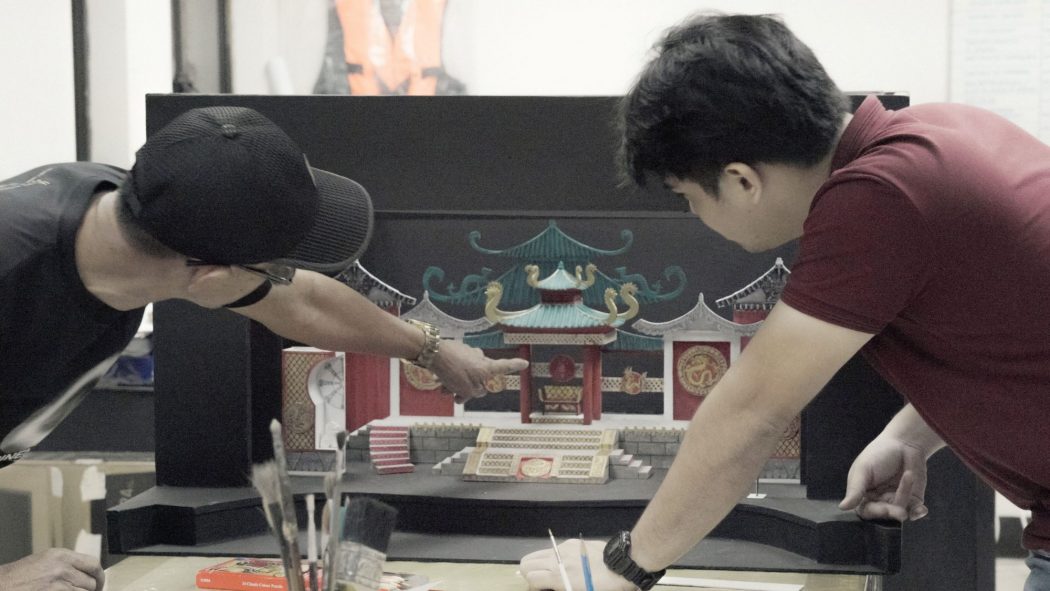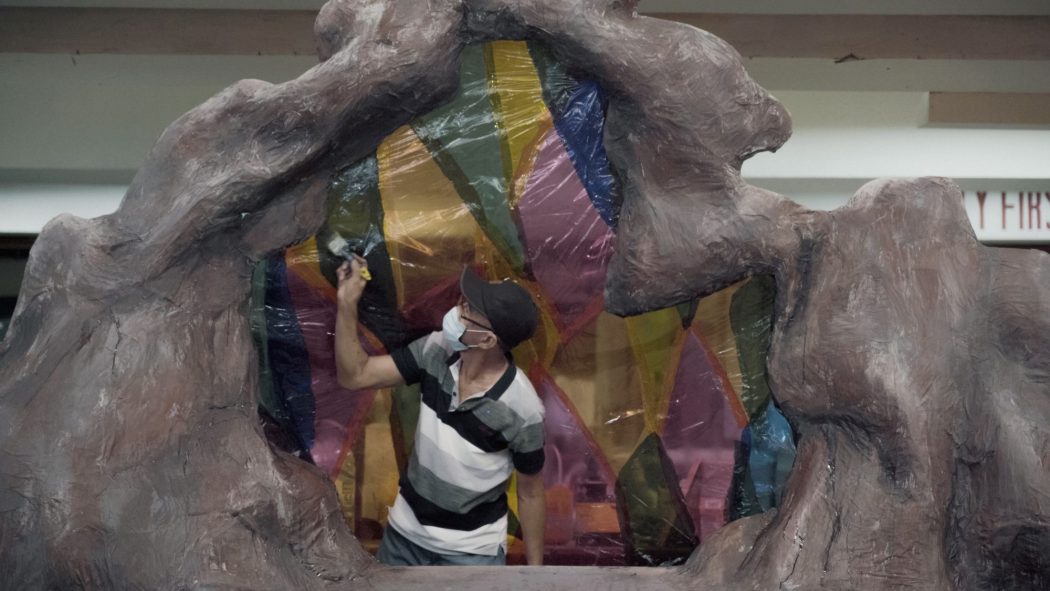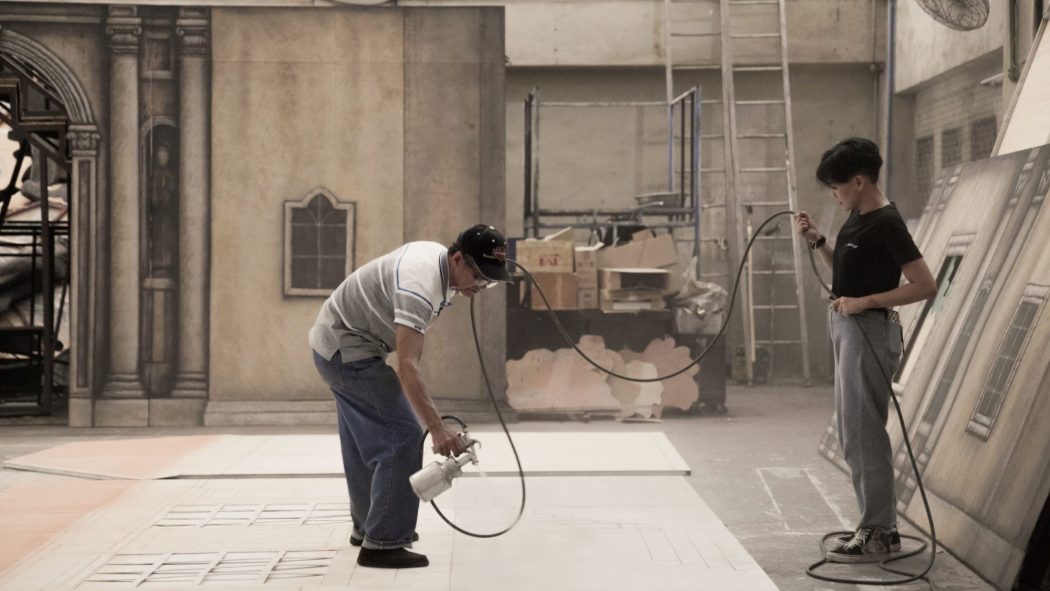Most often, audiences perceive the hard work that the actors, musicians, and rest of the cast – the so-called front liners of any production – put into a successful performance. But little do they know that the backliners – the backstage and production crew – spent the same if not more amount of time and energy on the production.
As the cast receives great adulation, the backstage crew often goes unnoticed. The costume designer who worked hard on the fittings and alterations, the technical staff who made sure that the lighting and sound system worked smoothly behind the scenes, the production people who made the artistic vision come alive with their hammers, paint brushes, and what have you.

While it may be a thankless job, there are some who take great pride in their backstage works like Annie Ignacio and Amado Bonifacio III, both working as production design personnel for the Cultural Center of the Philippines.
A theater arts graduate of the Polytechnic University of the Philippines, Ignacio first encountered CCP when she was invited as a performer for Pasinaya: The CCP Open House Festival, the country’s largest multi-arts festival happening every February.

After hearing great things about CCP from her friends who have been working at the Center, she decided to try her luck and inquired about a job opening. Weeks later, she started her new job as a theater crew at the Production Design Center. Later on, she was promoted as a draftsman.
Bonifacio, meanwhile, recalled doing his on-the-job training at CCP in 2016, a requirement to finish his engineering degree at the University of Manila. Two years later, in 2018, he became a reliever for one of the theater crew. He was later tasked to supervise the layout of the CCP’s Christmas decorations.
Ignacio and Bonifacio both trained under Francisco M. Galvero Jr., or Manong Junior to people he has worked with. For more than five decades until his retirement last year, Manong Junior remained the only scenic painter of the CCP.

After watching him create huge sets for different CCP productions, the mentees started shadowing this master. They would always see Manong Junior doing the scale models for the sets, and then bringing these miniatures into life-sized sets and sceneries.
Curiosity led Ignacio to this artistic path. She would ask questions, inquire about the artistic process of producing the sets, ask how to make things realistic and experiment with colors and textures to make the design come alive, among others.
“While working with Manong Junior, I noticed his hands. I told him that his hands look like my father’s hands,” shared Ignacio in a recent interview.

Bonifacio added that Manong Junior served as a father figure to him and his fellow workers. “As a mentor, he gave us artistic freedom to explore. He allows us to express our creativity, but he would appraise our works and rectify what we’ve done wrong in a very patient way,” said Bonifacio.
Being a backstage crew has its share of ups and downs. Sometimes, several productions are scheduled simultaneously, with everything happening all at once. When these happen, the workload could become overwhelming for the crew.
“There was a time when work piled up. We didn’t know what we should do first. My mind went blank, and I just cried. But after that, I return to work as if nothing happened,” said Ignacio.
Bonifacio noted a similar experience. “Even if we don’t want to, the nature of the work forces us to be workaholics. Things could get stressful and tiring, but we love what we are doing. That’s why we are still here.”
For both, work does not feel like work. They find fulfillment in seeing what they worked hard for and pour their hearts into on the stage.
For Ignacio, her biggest achievement to date was creating the now-iconic eye balloon for Cinemalaya 2019. The artwork was displayed at the CCP Main Building Grand Staircase and became an instant hit as an Instagrammable spot among film enthusiasts. She also did the realistic-looking bibingka and puto bumbong props for Tuloy Ang Pasko. These feats involved trials and errors, and hearing the compliments and receiving recognition made it all worth it for her. She says, “Manong Junior always tells us, not to be afraid to keep trying and make mistakes.”
Bonifacio, who takes pride in his work with the Art House Cinema Facade decor and Sinag: Festival of Lights, reveals that he doesn’t see himself as an artist. It was only when his mentor Manong Junior recognized him as an artist that he started pondering his work.

The CCP pays homage to these unsung heroes through a series of mini-documentaries by filmmaker Joseph Mangat, titled Backstage Pass. Launched during Cinemalaya 19, the second installment features scenic painter, Manong Junior, who had been working on sets for various CCP productions since the early 1980s. The first release featured the technical theater crew in the lights and flying sections.
Audience members are oblivious to the men and women working backstage behind the scenes. The Backstage Pass series puts the spotlight on them; with more features planned covering the CCP film technicians, sound crew, and costume custodians, as well as venue booking and front-of-house operations. The series also gives viewers a glimpse of the lesser-known careers in cinema and theater work.
